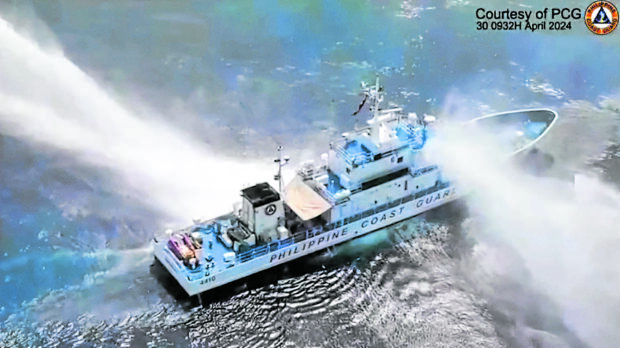PCG’s no water cannon rule vs China is a ‘wise policy’– security experts

‘NOT ONLY SHOCKING BUT APPALLING’ A frame grab from video footage released by the Philippine Coast Guard shows its ship, the BRP Bagacay, being hit by water cannon from Chinese coast guard vessels near the Chinese-controlled Scarborough Shoal in the West Philippine Sea. Also hit on its way to the shoal was the BRP Bankaw of the Bureau of Fisheries and Aquatic Resources.
MANILA, Philippines — The position of Philippine Coast Guard (PCG) of not using water cannons in retaliation to China is a prudent move, three maritime security experts said on Thursday.
Commodore Jay Tarriela, PCG spokesperson for the West Philippine Sea, on Wednesday said the humanitarian armed service wants to maintain professionalism in dealing with China Coast Guard despite China’s latest use of a water cannon, which damaged a Filipino “white ship” in Scarborough (Panatag) Shoal.
‘Wise policy’
“This seems like wise policy to me,” said Ray Powell, director of SeaLight, in a message to INQUIRER.net.
Powell, who heads the program of Stanford University’s Gordian Knot Center for National Security Innovation that tracks Chinese maritime activities in the West Philippine Sea, also stressed that a “direct retaliation” with CCG’s actions “would provide Beijing a pretext to escalate.”
Article continues after this advertisement“The Philippines doesn’t have the maritime capacity to engage in a direct contest of escalation with China,” Powell also said.
Article continues after this advertisementTwo Filipino maritime security experts also agreed with the PCG’s position.
“We should take the moral high ground on how we fight for our sovereign rights in our EEZ (exclusive economic zone),” said Rommel Jude Ong, a retired Philippine Navy rear admiral and a professor at the Ateneo School of Government, in a message to INQUIRER.net.
Chester Cabalza, president and founder of the Manila-based think tank International Development and Security Cooperation, said Manila should not succumb to Beijing’s illegal attacks.
“The Philippines should not stoop down to the continuous and damaging gray zone tactics and assault on the Philippines’ white ship,” Cabalza told INQUIRER.net.
“We observe the rules of engagement in freedom of navigation by not resorting to violence like aggressive firing of water canons,” he also said.
‘Lawfare’ trumps ‘warfare’
Cabalza also lauded the government’s move to assert its sovereign rights.
Beijing claims sovereignty in almost the entire South China Sea — including most of the West Philippine Sea — despite being effectively invalidated by a July 2016 international tribunal ruling stemming from a case filed by Manila in 2013.
“By winning the arbitration award, Filipino coast guardians have shown the world our finest qualities in dealing with warfare,” Cabalza said.
“We uphold the rules-based order through ‘lawfare’ … We firmly believe in dialogues and maritime diplomacy,” he explained.
PCG’s ‘transparency initiative’ winning
Powell, meanwhile, also noted the PCG’s gains in its “transparency initiative,” which sought to expose Beijing’s activities in the western section of Manila’s exclusive economic zone.
“It is now succeeding in its asymmetric information operation by increasing national resilience and international support while imposing severe reputational costs on Beijing for its actions,” he also said.
Tarriela says PCG will expose Beijing’s aggressive actions every time.
“Each infringement and provocation by Beijing in the West Philippine Sea will be exposed to the international community to show how they disrupt the regional stability and blatantly violate the Unclos (United Nations Convention on the Law of the Sea) and international law,” Tarriela said in a post on X (formerly Twitter) on Wednesday.